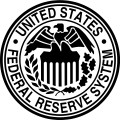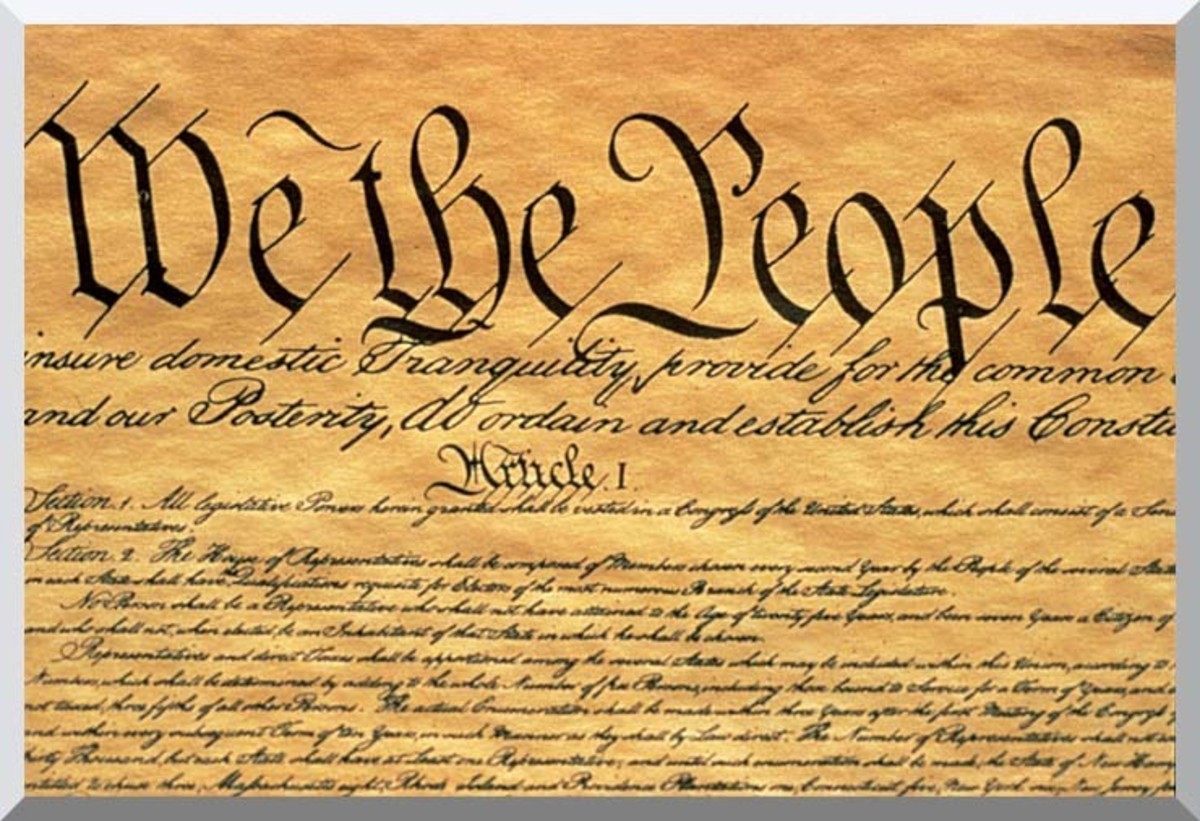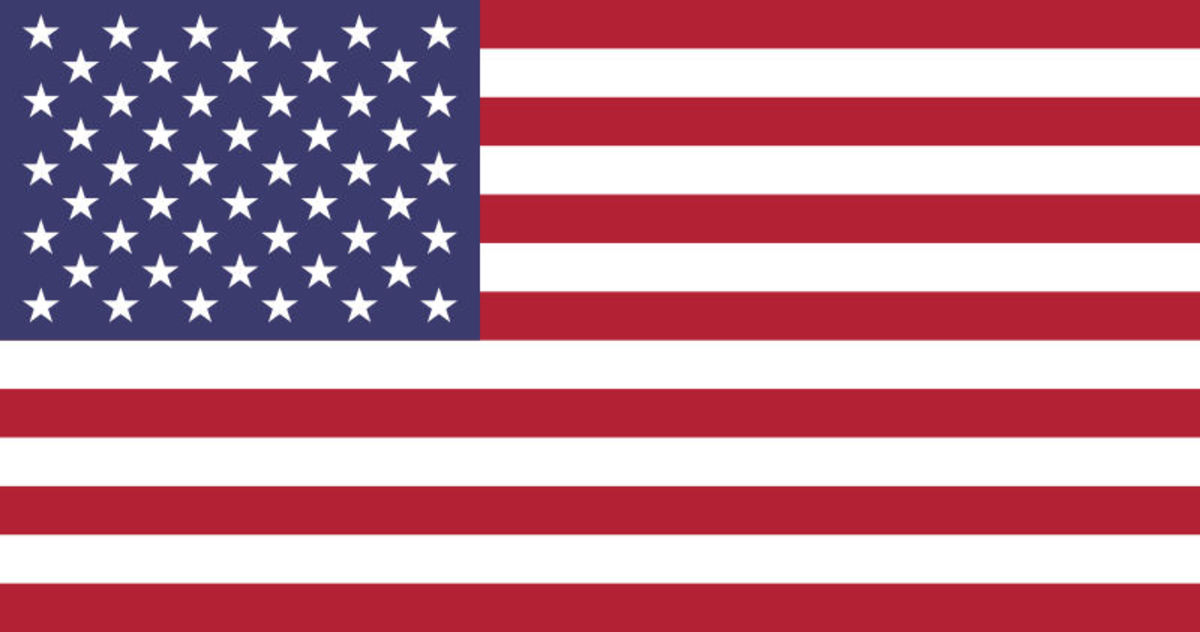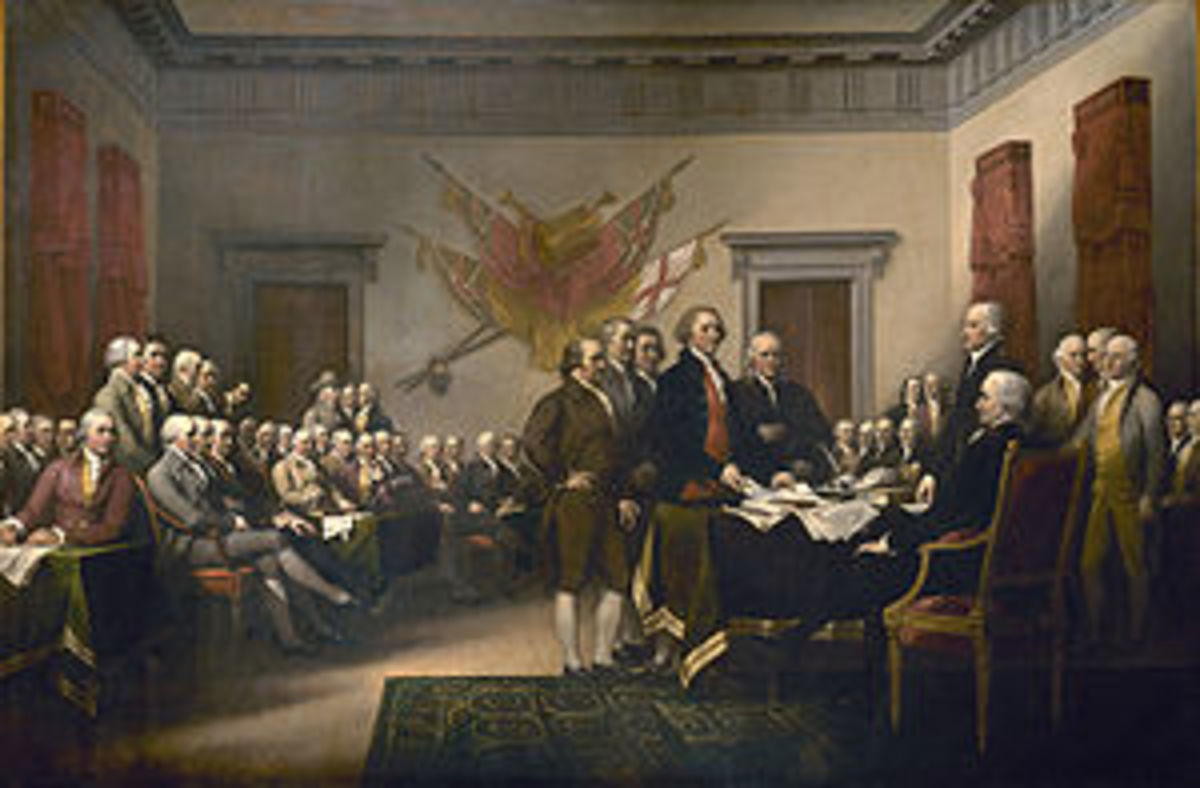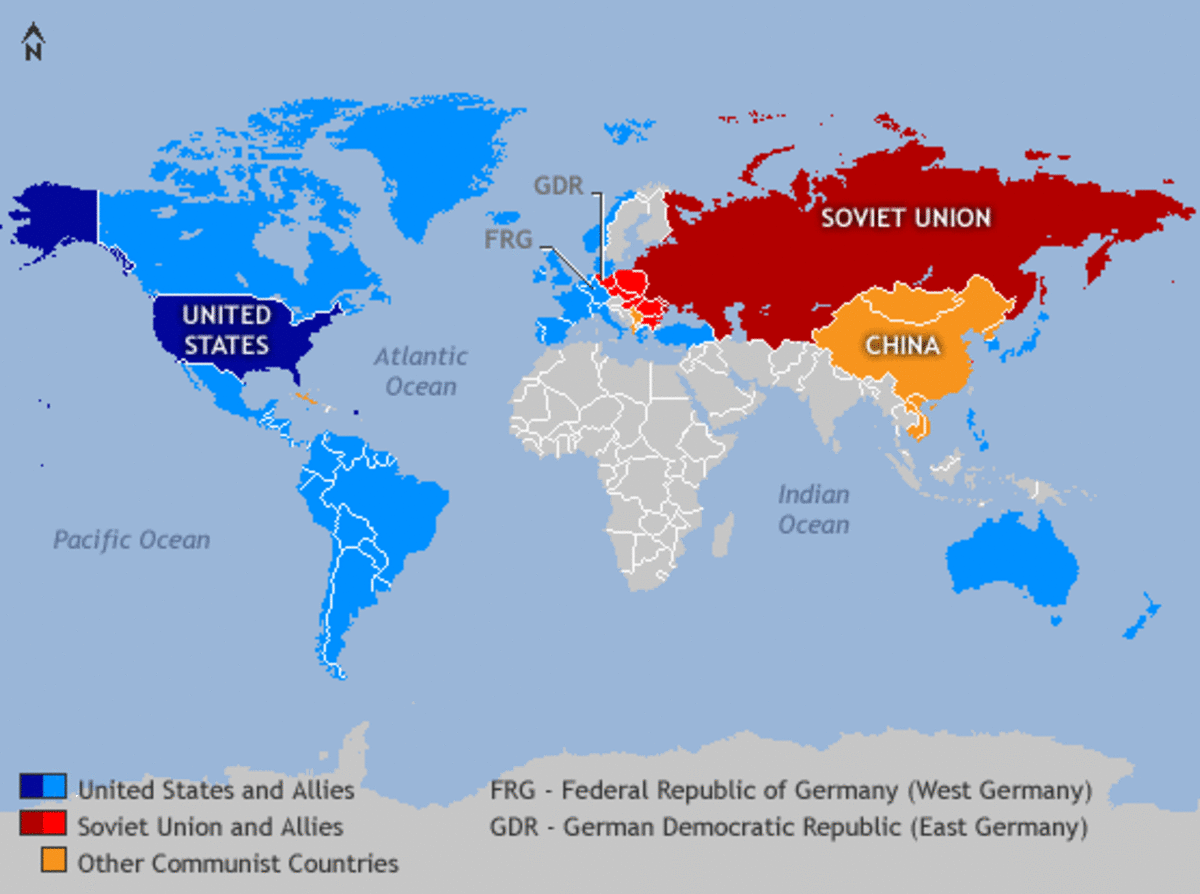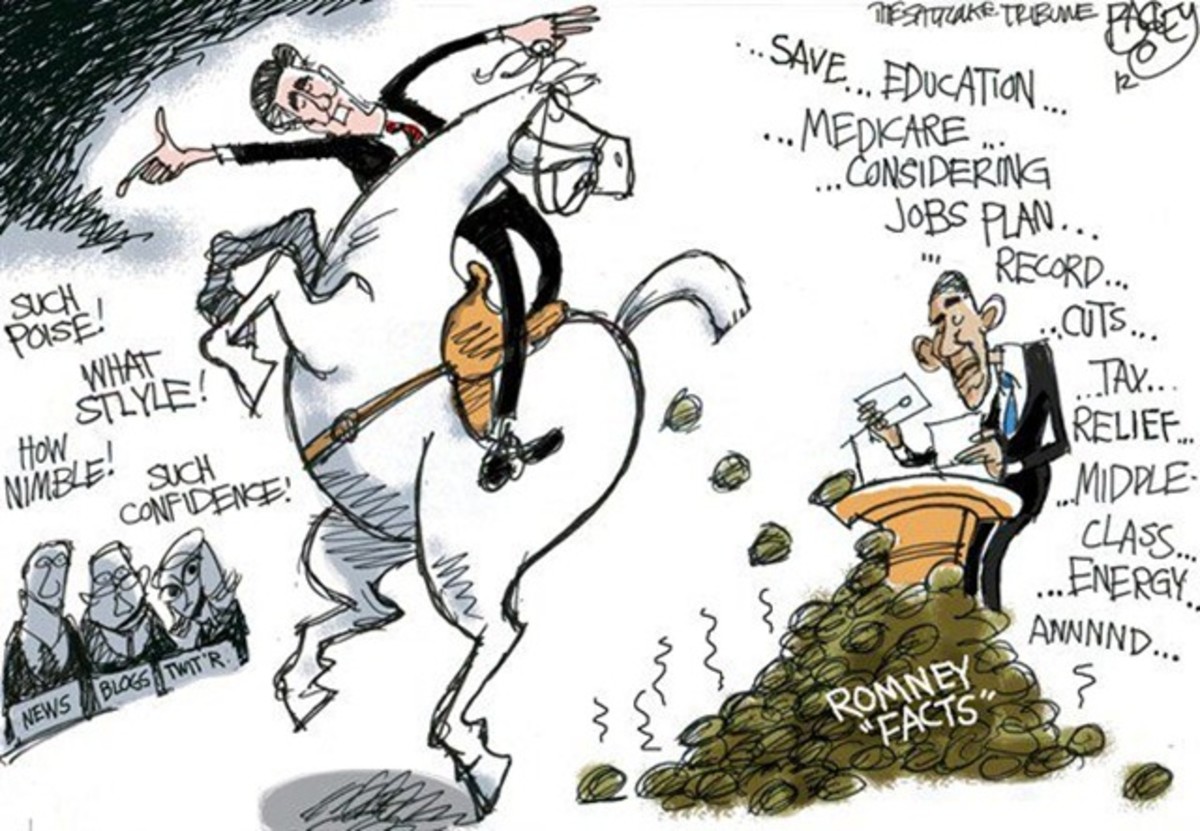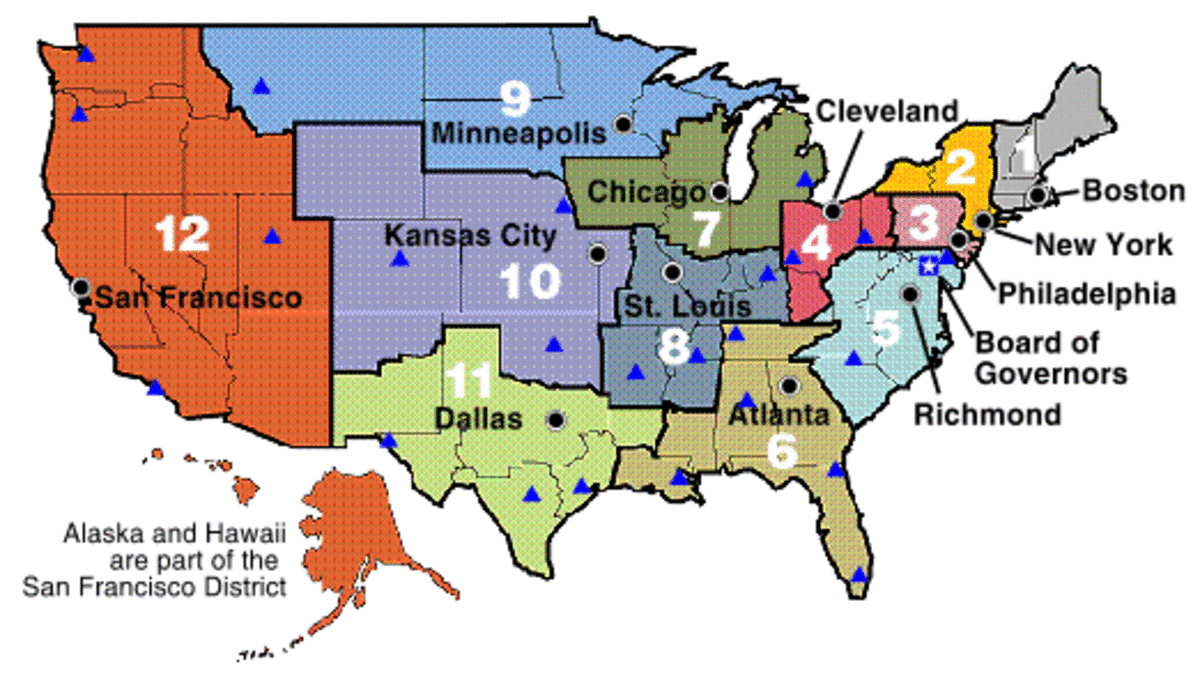On Principle and Pragmatism Va: What Does Limited Government Really Mean - Cast of Characters? [99]
U.S. CONSTITUTION page 1
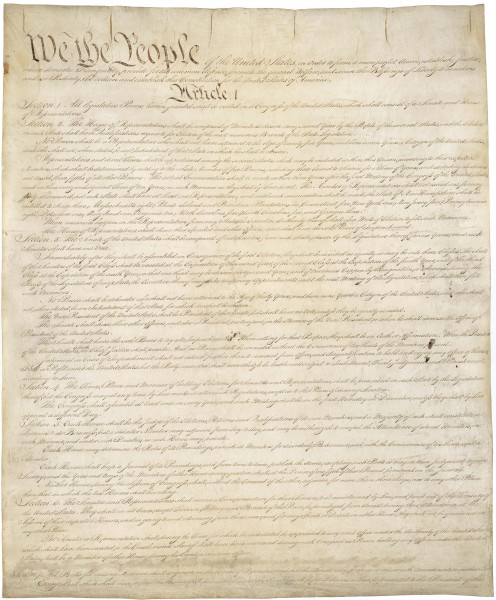
“The government of the United States is not in any sense founded upon the Christian religion” - John Adams, POTUS # 2
The Form of Government, which you admire, when its Principles are pure is admirable, indeed, it is productive of every Thing, which is great and excellent among Men. But its Principles are as easily destroyed, as human Nature is corrupted. Such a Government is only to be supported by pure Religion or Austere Morals. Public Virtue cannot exist in a Nation without private [virtue], and public Virtue is the only Foundation of Republics. There must be a positive Passion for the public good, the public Interest, Honour, Power and Glory, established in the Minds of the People, or there can be no Republican Government, nor any real Liberty: and this public Passion must be Superiour to all private Passions. Men must be ready, they must pride themselves, and be happy to sacrifice their private Pleasures, Passions and Interests, nay, their private Friendships and dearest Connections, when they stand in Competition with the Rights of Society.
John Adams to Mercy Warren - 16 Apr. 1776Warren-Adams Letters 1:222--23
"No man shall be compelled to frequent or support any religious worship, place, or ministry whatsoever, nor shall be enforced, restrained, molested, or burdened in his body or goods, nor shall otherwise suffer, on account of his religious opinions or belief; but that all men shall be free to profess, and by argument to maintain, their opinions in matters of religion, and that the same shall in no wise diminish, enlarge, or affect their civil capacities."
From 1779 Virginia Bill of Religious Freedom authored by Thomas Jefferson, POTUS #3
"Millions of innocent men, women and children, since the introduction of Christianity, have been burned, tortured, fined and imprisoned. What has been the effect of this coercion? To make one half the world fools and the other half hypocrites; to support roguery and error all over the earth... Our sister states of Pennsylvania and New York, however, have long subsisted without any establishment at all. The experiment was new and doubtful when they made it. It has answered beyond conception. They flourish infinitely. Religion is well supported; of various kinds, indeed, but all good enough; all sufficient to preserve peace and order: or if a sect arises, whose tenets would subvert morals, good sense has fair play, and reasons and laughs it out of doors, without suffering the state to be troubled with it. They do not hang more malefactors than we do. They are not more disturbed with religious dissensions. On the contrary, their harmony is unparalleled, and can be ascribed to nothing but their unbounded tolerance, because there is no other circumstance in which they differ from every nation on earth. They have made the happy discovery, that the way to silence religious disputes, is to take no notice of them. Let us too give this experiment fair play, and get rid, while we may, of those tyrannical laws."
From Thomas Jefferson's 1787 Notes on the State of Virginia
U.S. Constitution, Page 2
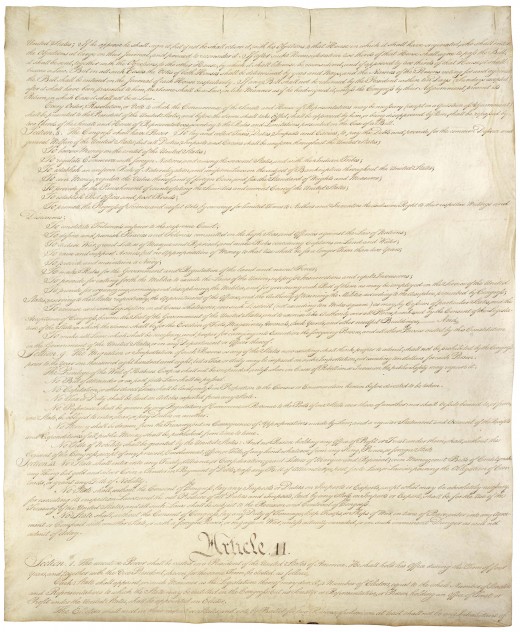
The U.S. Constitution: Principled or Pragmatic?
THE UNITED STATES CONSTITUTION begins with a high Principle. Always keeping that goal in mind, everything that follows, from Article I to Article VII, is very a Pragmatic approach designed to on that promise.
The Preamble to the Constitution states;
"We the People of the United States, in Order to form a more perfect Union, establish Justice, insure domestic Tranquility, provide for the Common Defense, and promote the General Welfare and secure the Blessings of Liberty to ourselves and our Posterity, do ordain and establish this Constitution for the United States of America."
This powerful, to me anyway, awe inspiring, historic sentence, one which changed the world forever, is the only statement of Principle in the U.S. Constition, but boy, what a statement it is! The rest of the Constitution is pure Pragmatism, a creation from the minds of a group of highly principled, brave, dedicated, patriotic men in such a way as to survive the test of time. Anything less would have failed a long time ago.
Before moving on, please bear with me while I say one more thing about the Constitution being the source of all of the principles being bandied about by both the Right and the Left; of which I suppose I am guilty as well. The fact of the matter is, beyond what is stated in the Preamble, there are extremely few Principles presented in the body of the Constitution itself upon which to strictly or broadly contruct anything whatsoever. In fact, Madison, et al, left many elements of the Constitution puposefully vague, open to interpretation by those who followed them. There was a practical reason for this, they wanted a document which 1) could be accepted by the majority of those who attended the Constitutional Convention and 2) could be approved by the people of the various States. The Bill of Rights is likewise barren although there is much more fodder for argument because of the pragmatic ambiguity built-in to satifsty both the Conservative or anti-Federalist, anti-Constitutionalists and Progressive, Federalist, Pro-Constitutionalists in order to get the Constitution ratified. (see On Principal and Pragmatism II - U.S. Constitution Ratification Almost Didn't Happen)
On the Federalist side you had such writings as the Federalist papers laying out the arguments why the Constitution should be signed; you hear much of the same arguments being used again today. The same is true regarding the anti-Federalist where Patrick Henry of Virginia and Robert Yates of Pennsylvannia wrote prolifically, arguing against ratification. These would be familiar refrains for they are often repeated by the adherents of the Tea Party movement today. Both factions, Federalist and anti-Federalist, made cases for the need for this new institution to be "limited" in its authority to fulfill the Principles articulated in the Preamble. Because of the need to write a document acceptable to enough citizens to be ratified, what the framers meant by "limited" was left ambiguous, to be defined and redefined over the ensuing centuries.
As a result, neither side can point to the U.S. Constitution and say definitively, "Look, see there, it is as plain as the nose on your faceand in black and white no less; no interpretation is needed to prove my case." Nobody can do this because it was impossible to design the Constitution or the Bill of Rights in such a way that a single interpretation was self-evident. If it had been, there would have been no United States because there never would have been any agreement, don't you see.
The source of all the vitriolic rhetoric we hear today over "limited governent" actually derives from the arguments used for and against the ratification of the Constitution between 1787 and 1790. For three years, extremely heated, some times violent arguments flew back and forth between the two factions making today's fight between the Conservatives and Democrats look more like a friendly spat. It was only when the compromise called the Bill of Rights was devised did enough anti-Federalists join with the Federalists to push through the ratification of Constitution in 1790.
So, when I hear a Right-winger on the POTUS' "Stand-up With Pete Domonic" show ("Politics for the United States" channel 124 on Sirus/XM) say something to the effect that
"in order to save itself from financial disaster during the 2008 financial meltdown, the United States had to sell its soul to the devil by bailing out the banks and car companies in violation of the fundamental principle this country was founded on that each person and business has the opportunity to work hard and possibly be a success and reap the rewards or fail and fall by the wayside, but in either case, the government must stand on the sidelines"
do I know that he doesn't know what he is talking about.
The Cast of Characters
FIRST, I WOULD like to lay out the players in the creation of the United States Constitution and give a rough idea of which camp, Conservative or Progressive, they tended to sit in. Those that signed it were all Federalists to one degree or another in the end because they believed in some sort of strong central government without a Bill of Rights; the more Conservative (or, more correctly, "limited government" liberal) members walked out and did not participate. It is this interaction between the moderate Conservative and Progressive camps (Tea Partyers and Conservatives, there is a lesson here) that resulted in what should really be called the Great Compromise of 1797, U.S. Constitution.
Before presenting the list of those primarily responsible for the Constiutution itself, there has been frequent reference to the term founding fathers, so just to be clear, I thought I would present who the contemporary American historian Roger Morris of Pensylvania considered the seven men who should be considered the founding fathers of the United States:
- Benjamin Franklin
- George Washington
- John Adams
- Thomas Jefferson
- John Jay
- James Madison
- Alexander Hamilton
The total cast of characters who attended the Constitutional Convention, along with the political leanings is presented in the table below (remember, when I refer to Conservatives, I am generally referring to moderates):
PLAYERS AT THE CONSTITUTIONAL CONVENTION
'LIMITED GOV'T" CAMP
| STATE
| "BROAD GOV'T" CAMP
| STATE
|
|---|---|---|---|
NICHOLAS GILMAN
| NEW HAMPSHIRE
| GEORGE WASHINGTON
| VIRGINIA
|
NATHANIEL GORHAM
| MASSACHUSETTES
| ABRAHAM BALDWIN
| PENNSYLVANNIA
|
RUFUS KING
| MASSACHUSETTES
| BENJAMAN FRANKLIN
| PENNSYLVANNIA
|
WIALLIAM SAMUEL JOHNSON
| CONNECTICUT
| JOHN LANGDON
| NEW HAMPSHIRE
|
ROGER SHERMAN
| CONNECTICUT
| ALEXANDER HAMILTON
| NEW YORK
|
WILLIALM LIVINGSTON
| NEW JERSEY
| DAVID BEARLEY
| NEW JERSEY
|
WILLIAM PATTERSON
| NEW JERSON
| JONAH DAYTON
| NEW JERSEY
|
THOMAS FITZSIMONS
| PENNSYLVANIA
| ROBERT MORRIS
| PENNSYLVANIA
|
JAMES WILSON
| PENNSYLVANIA
| THOMAS MIFLIN
| PENNSYLVANIA
|
JARED INGERSOL
| PENNSYLVANIA
| GOUVERNOR MORRIS
| PENNSYLVANIA
|
GEORGE READ
| DELAWARE
| JOHN DICKONSON
| DELAWARE
|
JACOB BROOM
| DELAWARE
| GUNNING BEDFORD JUN
| DELAWARE
|
RICHARD BASSETT
| DELAWARE
| JAMES MCHENRY
| MARYLAND
|
DANIEL CARROLL
| MARYLAND
| DANIEL OF ST.THOMAS JENIFER
| MARYLAND
|
JOHN BLAIR
| VIRGINIA
| JAMES MADISON JR.
| VIRGINIA
|
WILLIAM FEW
| GEORGIA
| WILLIAM BLOUNT
| NORTH CAROLINA
|
HU WILLIAMSON
| NORTH CAROLINA
| RICHARD DOBBS SPAIGHT
| NORTH CAROLINA
|
J RUTLEDGE
| SOUTH CAROLINA
| CHARLES PINCKNEY
| SOUTH CAROLINA
|
CHARLES COTEWORTH PINCKNEY
| SOUTH CAROLINA
| PIERCE BUTLER
| SOUTH CAROLINA
|
PLAYERS AT THE CONSTITUTIONAL CONVENTION
Related of Interesting Hubs
- On Principle and Pragmatism I - U.S. Constitutional ...
OpinionDuck, in one of his comments, invited me to his profile; i am glad I went and would encourage you to go as well. Since I don't have OpinionDuck's permission, I won't copy from the profile but the gist of the opening is that Our opinion is... - On Principle and Pragmatism II - U.S. Constitution R...
Most Americans, including most Conservatives and Tea Party types, as well as Democrats, are not aware how close we came to not having an America at all. Roughly 50% of colonialists wanted something more like the what the European Union is today, exce - On Principles and Pragmatism IIIa - Plato, Washingto...
The foundation for the U.S. Constitution stretch all the way back to 400 B.C. Our Founding Fathers read extensively of the works of Plato and Aristotle. These two great thinkers, among others, had great influence on what our government looks like tod - On Principles and Pragmatism IIIb - Plato, Washingto...
http://myesoteric.hubpages.com/hub/On-Principles-and-Pragmatism-IIIb-Plato-Washington-Adams-Jefferson-and-the-US-Constitution-81 - On Principles and Pragmatism IIIc - Plato, Washingto...
The foundation for the U.S. Constitution stretch all the way back to 400 B.C. Our Founding Fathers read extensively of the works of Plato and Aristotle. These two great thinkers, among others, had great influence on what our government looks like tod - On Principle and Pragmatism IV - What do Plato, Aris...
What are the philosophical underpinnings of the Democratic and Republican political theories; they have very deep roots going back to 400 B.C.E. and two of the most famous thinkers in history. Come read. - Inception and the Philosophy of Pragmatism
For all the interesting science-fiction elements and the exploration of the psycho-physical nature of dreaming Inception is ultimately grounded in basic principles of philosophical pragmatism. - Evolution and Creationism - My Take On Them and How ...
Where do I come from? Why am I here? What is the origin of life? Should we look to science or to the Bible for answers? Or both? Did God create us, or did we evolve from simple sea creatures? Are we related to apes, or especially made in God's image? - Statement of His Holiness the Dalai Lama on the 48th...
10 March 2007 On the occasion of the forty-eighth anniversary of the Tibetan people’s peaceful uprising in Lhasa in 1959, I offer my prayers and tribute to all those Tibetans who have suffered and...

